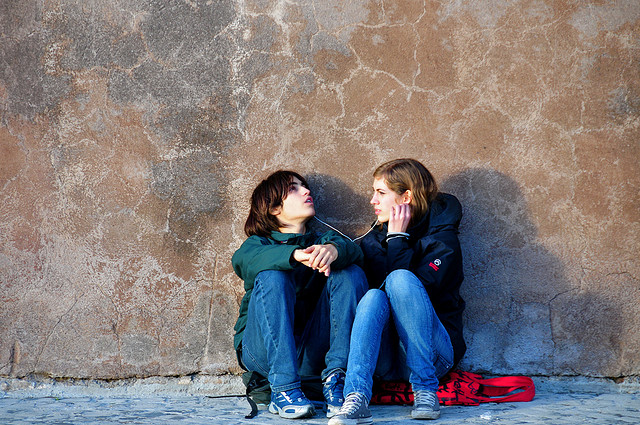
Ed Yourdon / flickrSharing brings us closer.
The interwebs these days are packed with sites designed to help you get rid of your old couch, offload that pile of scrap lumber from the garage, and otherwise share your stuff with everyone else on the planet. Mr. Rogers would be proud. But do we really need another “sharing” tool?
Adam Werbach thinks so. That’s why the former Sierra Club president and author of Strategy for Sustainability founded yerdle, an online sharing platform that launched in the Bay Area in November and spreads to New York City this month. He and cofounders Andy Ruben and Carl Tashian recognize that we already do an awful lot of sharing. “We just want to help speed it up,” he says. “We set out to make it as easy to share things with friends as it is to buy things.”
Yerdle follows in the footsteps of platforms like NeighborGoods and the now-defunct OhSoWe. But unlike its predecessors, it works through Facebook, connecting users to their “friends” and friends of friends. Dana Frasz, a self-described freegan and an early Bay Area yerdle user, says those fewer degrees of separation set the service apart from established giving-economy platforms like Freecycle. “You’re meeting people who know your people, but you just haven’t been connected yet,” she says.
“It seemed like every single person I met on yerdle was awesome,” Frasz continues. “Instead of just a Freecycle pickup where someone leaves [an item] on their door handle, I’d wind up talking with these people for an hour.”
 Frasz had three yerdle exchanges with folks who work at Sungevity, where her partner just started a new job; her sharing with his coworkers made his social transition to a new company that much easier. Once, Frasz ended up telling a fellow yerdle user about the work she does reducing food waste. A few days later the woman called Frasz from a bakery that was about to toss four bags of bread. The two were able to meet up, save the bread from its dumpster fate, and donate it to a hunger-relief group.
Frasz had three yerdle exchanges with folks who work at Sungevity, where her partner just started a new job; her sharing with his coworkers made his social transition to a new company that much easier. Once, Frasz ended up telling a fellow yerdle user about the work she does reducing food waste. A few days later the woman called Frasz from a bakery that was about to toss four bags of bread. The two were able to meet up, save the bread from its dumpster fate, and donate it to a hunger-relief group.
This potential for real connection is key to the success of any sharing-economy platform, says Lauren Anderson, who runs Collaborative Consumption Hub, a “one-stop shop” for information about sharing economies, with Rachel Botsman — the woman who literally wrote the book on the sharing economy. “A lot of companies have failed because they haven’t been able to evangelize the community around their idea,” she says. “Even though the platform could be global, people are generally interacting on a local level. Maintaining that local sense of connection is fundamental to the strength of that community.”
Yerdle makes it extra easy to build community because no money exchanges hands. Instead, Frasz says, the service “sparks and perpetuates a gift economy.” A woman taking some martini glasses off Frasz’s hands showed up at her place with cookies. Frasz likes to bring rosemary and kale from her garden in exchange for what other people give her. “It’s not expected, but it’s just fun,” she says. “If someone’s giving you something you really like, and you have a few cookies or things from your garden to share, it makes the deal that much sweeter.”
Still, platforms like yerdle face a tricky problem of scale. On one hand, they want to maintain the sense of intimacy that will set them apart from the free section of Craigslist — once companies reach a certain scale, Anderson points out, they start attracting people “who don’t have the same values.” On the other hand, keep it too intimate, and you won’t be able to build enough critical mass to actually be useful. “If somebody comes to your platform and they can’t find what they’re looking for instantly, chances are they’re not going to come back a second time,” Anderson says.
Social, mobile, and location-based technologies make it easier to “retain the small nest within the big nest,” as Anderson puts it. Yerdle’s Facebook interface, for example, keeps exchanges confined to loose networks that already exist, increasing the chance that connections will carry on in real life.
But this gets back to the question of whether such platforms are even necessary in the first place. Why can’t we just ask our friends if they have what we need? Why do we require some special technology to facilitate what used to be a basic component of social life?
“The truth of the matter is, it’s been a good 60 or 70 years since we really traded or exchanged [in that way],” Anderson says, pointing out that breakdowns in neighborly trust began long before the internet, back when we started leaving small towns in droves and barricading ourselves behind the wheel and in front of the TV. “What technology’s done is [enabled] people to return to a manageable-size community. The isolation of the big city makes it hard to connect with like-minded people in an organic way outside your typical routine. Technology has allowed us to find people with shared interests in close proximity.”
As we’ve been exploring different aspects of the sharing economy here at Grist, I’m starting to be convinced of exactly what Anderson is saying — that web platforms for sharing represent online networks at their best. Something like yerdle isn’t designed to help us avoid social interaction, but rather to maximize, as Werbach puts it, our “enormous capacity for generosity.”



